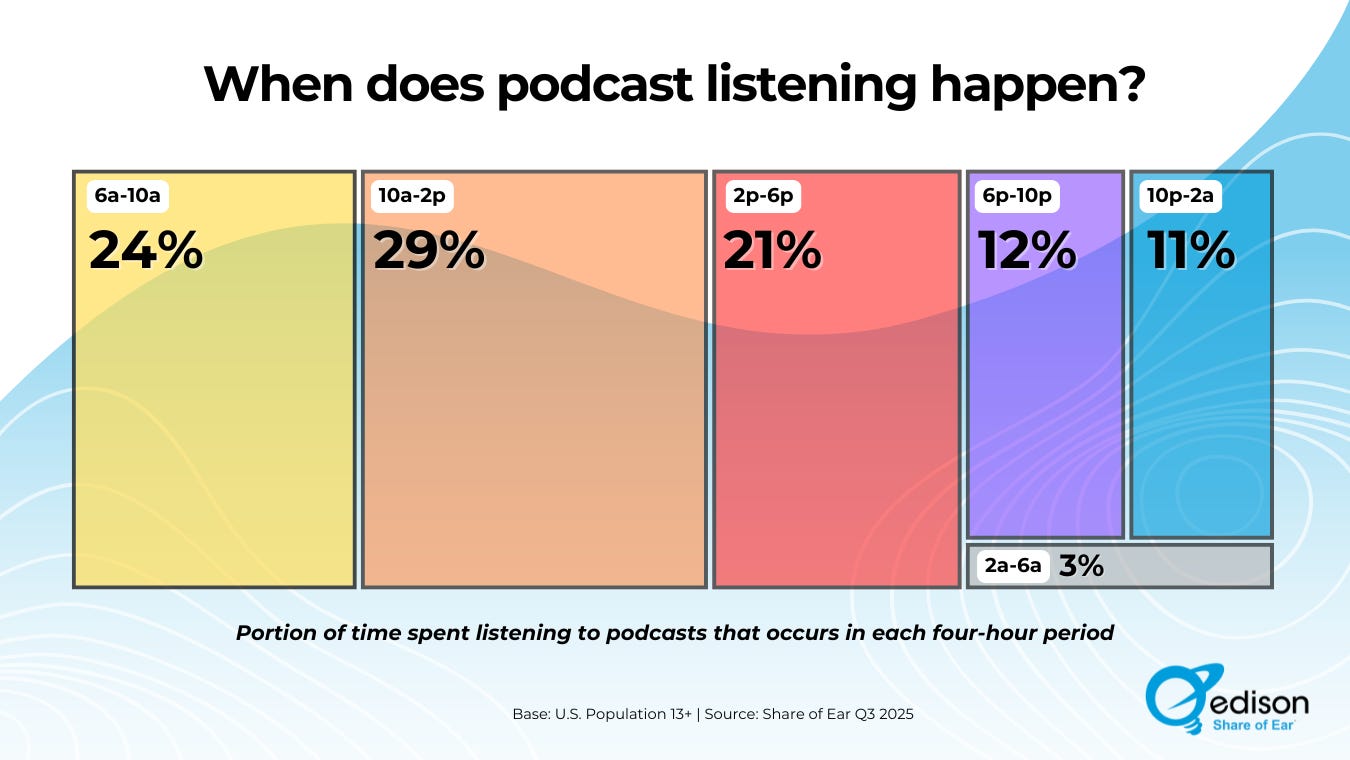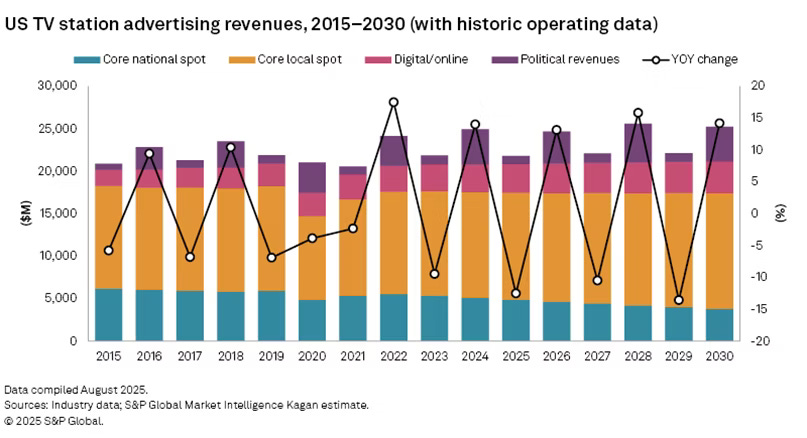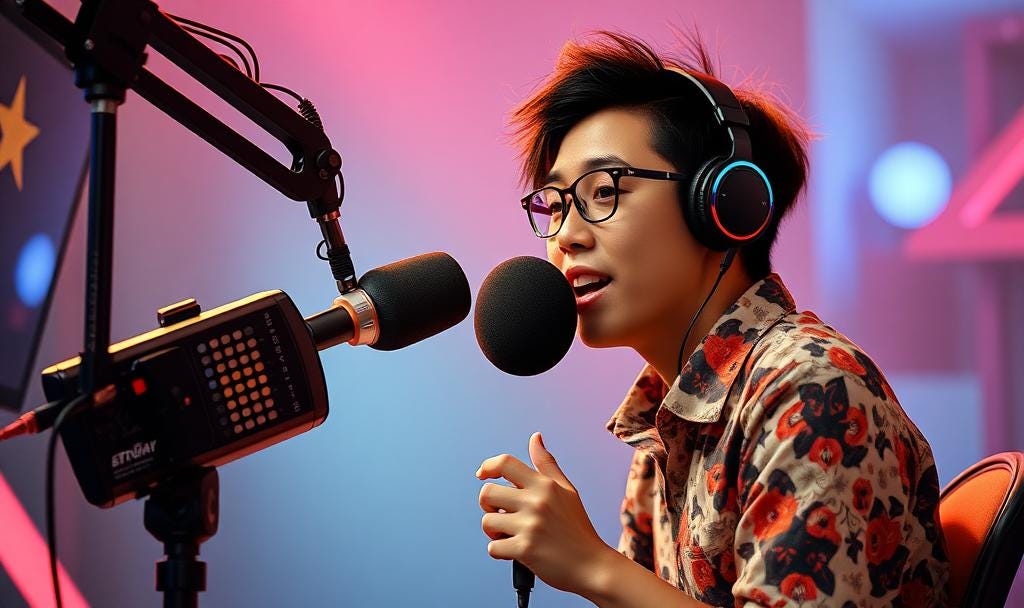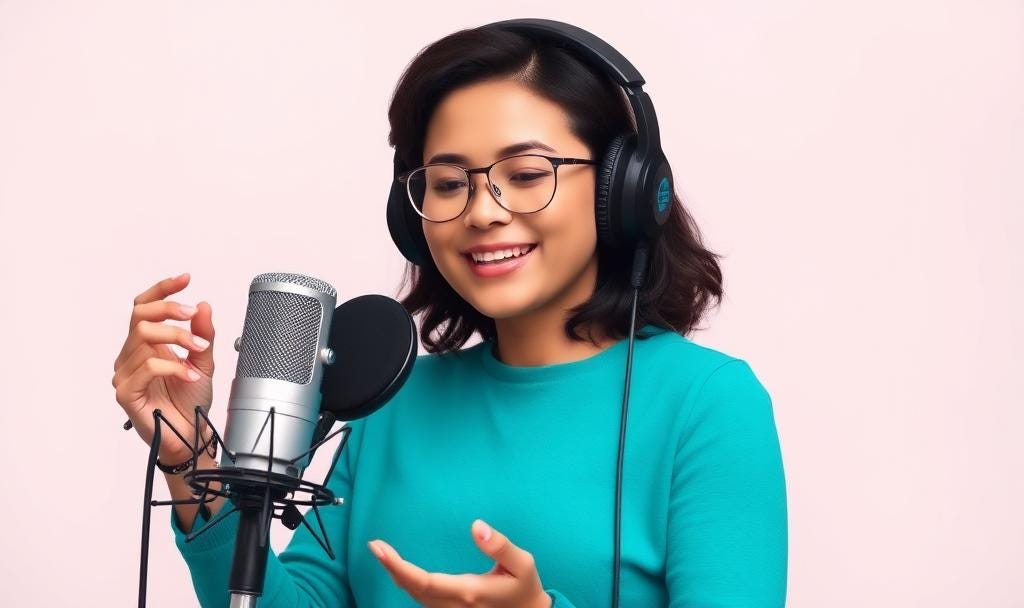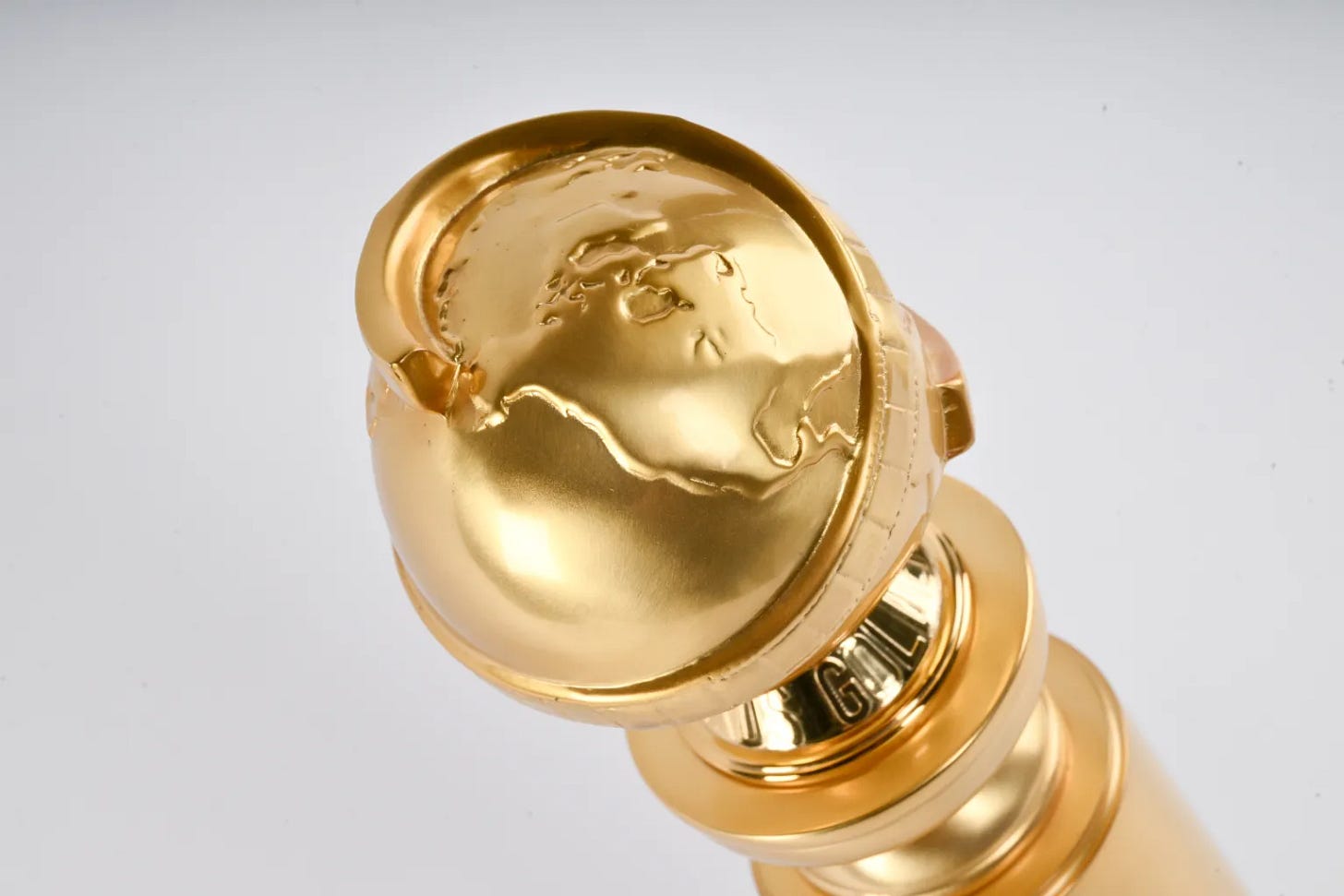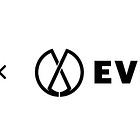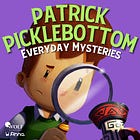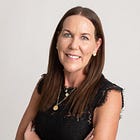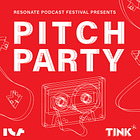Did someone forward this to you?
Become one of the more than 1000 valued email subscribers. Find Out More 👈
👋 Hi, Podsky!
We are thrilled to present the latest Weekend edition of Podcast In Brief! And don't worry, our loyal listeners — you'll still get the occasional real-time update!
Thank you to all our free and paid subscribers for continuing to support us. As an independent media organisation, we can only continue our work with the support of readers like you, unlike others who are supported by well-funded organisations.
Your subscription to Podwires will help to fund our operations as an independent media organisation. Becoming a paid subscriber
First time reading? We would be delighted if you would join us – after all, we have over 1,000 intellectually curious readers already! Sign up here.
We want everyone to know about this, so please spread the word by sharing the email with your friends! (copy URL here)
And, as always, send us feedback at editor@podwires.com
Today's reading time is 5 minutes. - Miko Santos
🎙️Today, we've got the inside scoop on:
Prime Time for Podcasts: When Your Audience Actually Listens
Radio’s Lifeline is Your Competition: What Broadcast’s Decline Means for Podcasting
AI Podcast Hosts Don’t Need to Sound Human—They Need to Match Your Vibe
The Biology of Trust: Why Your Voice is Your Most Valuable Asset
Bonus: The Golden Globes Want to Give Us an Award. Should We Want It Back?
Elsewhere: YouTube Launches Second Chance Pilot Program Allowing Terminated Creators to Request New Channels After One Year.
Prime Time for Podcasts: When Your Audience Actually Listens
The Podwires Rundown : If you’ve been scheduling your podcast releases at midnight because “that’s when Spotify updates,” you might want to rethink your strategy. New data from Edison Research’s Share of Ear study reveals exactly when Americans are actually consuming podcasts – and the findings should fundamentally change how you think about release timing, promotional windows, and even content programming decisions.
The Data :Edison Research’s Q3 2025 Share of Ear study, scheduled for full release to subscribers next week, reveals that Americans age 13+ spend 10% of their total daily audio time listening to podcasts. The study tracked podcast consumption patterns across all dayparts among the 13+ demographic, providing the most comprehensive picture of when podcast listening actually occurs throughout the day.
The Key Points:
The midday window (10am-2pm) dominates podcast consumption at 29% – nearly a third of all daily podcast listening happens in this four-hour block
Early morning (6am-10am) captures 24% of listening – the traditional commute and morning routine window remains strong even in hybrid work environments
Midafternoon (2pm-6pm) accounts for 21% of podcast consumption – the post-lunch slump is apparently a podcast consumption opportunity
Evening and overnight listening is more significant than expected – 11% occurs between 10pm-2am, with an additional 3% happening from 2am-6am
Podcasts claim 10% of Americans’ total daily audio time – a substantial share competing against AM/FM radio, streaming music, and other audio platforms tracked by Share of Ear
Why It Matters : This isn’t just interesting trivia about listener behavior – it’s actionable intelligence that should influence every decision from when you hit publish to when you schedule social promotion. The concentration of listening in specific dayparts means your new episode release timing, your promotional push schedule, and even your advertising strategy should align with when ears are actually available. If you’re treating podcast distribution like it’s still 2015 – release it and forget it – you’re leaving audience and revenue on the table.
The Big Picture :For podcasters and producers, this data transforms guesswork into strategy. Release your episodes before 10am to capture that massive midday listening block, and schedule your social media promotion to hit during the 6am-2pm window when the majority of your audience is actively consuming. This is when you want your episode at the top of feeds and your promotional content in front of eyeballs.
For sales teams and advertisers, understanding these consumption patterns means you can strategically place time-sensitive promotions and calls-to-action during peak listening windows. The overnight listening percentage (14% combined from 6pm-6am) also validates investment in evergreen content and deep-dive programming that serves different audience segments with varying schedules. The industry as a whole benefits from having concrete data to counter the assumption that podcasts are merely “background content” – this level of time investment across specific dayparts demonstrates intentional, engaged consumption that deserves premium positioning in the broader audio ecosystem.
🛑 BE PODWIRES PAID SUBSCRIBER
As a paid subscriber, you will get all of the following for only $8 a month or $80 a year (or the equivalent in your local currency):
📰 Podwires Job Board - Get the latest Podcast job around the world
🎙️ Podcast Marketplace - 1000 + Independent Podcast Producers ready to help you.
Podwires Superfan - We can keep doing our work with the help of readers like you, unlike other media organisations that get money from big companies.
Radio’s Lifeline is Your Competition: What Broadcast’s Decline Means for Podcasting
The Podwires Rundown: While TV and radio stations watch their traditional ad revenue circle the drain, they’re making a calculated pivot that should get your attention: they’re coming for podcast revenue. S&P Global’s new Broadcast Outlook 2025 reveals that radio station owners are shifting investment from cost-cutting to podcasting, streaming, and digital marketing services as their legacy business models collapse. Radio’s digital revenue – including podcasting – is projected to grow 6.5% in 2025 to $1.75 billion, eventually reaching $2.31 billion by 2030. Translation: established broadcasters with massive local reach, existing sales teams, and decades of advertiser relationships are betting their future on the medium you’re building.
The Data : S&P Global Market Intelligence’s comprehensive Broadcast Outlook 2025, authored by Justin Nielson and released October 7, projects a brutal contraction for traditional broadcast media over the next five years. TV station ad revenue will decline 12.5% to $21.81 billion in 2025, with national spot revenue dropping 4.3%. Radio faces similar headwinds, with national spot ad revenue declining 5.0% to $1.76 billion in 2025. However, the report identifies podcasting as a critical growth engine, with S&P Global Market Intelligence Kagan projecting podcast ad revenue to surge 22% in 2025, crossing the $1 billion threshold for the first time.
The Key Points:
Podcast ad revenue is projected to grow 22% in 2025, surpassing $1 billion – making it one of the fastest-growing revenue streams in the audio landscape while traditional broadcast contracts
Radio station owners are investing heavily in podcasting and streaming as digital revenue grows 6.5% to $1.75 billion in 2025, reaching $2.31 billion by 2030, offsetting declines in traditional spot advertising
Radio’s national spot ad revenue will decline 5.0% to $1.76 billion in 2025 and continue contracting to $1.48 billion by 2030, while local spot ads fare slightly better with a 4.0% decline to $7.66 billion
Traditional broadcasters are shifting from cost-cutting to investing in new talent and formats – specifically radio-personality-driven podcasts that leverage existing audience relationships and local market dominance
TV station ad revenue drops 12.5% to $21.81 billion in 2025 (excluding political and Olympics bumps), with the steepest declines in national advertising where podcasting increasingly competes for the same dollars
Why It Matters: This isn’t just about legacy media’s problems – it’s about who’s coming to compete in your space with structural advantages you don’t have. When radio stations pivot to podcasting, they bring established local advertiser relationships, professional sales teams who’ve been selling audio for decades, existing production infrastructure, and built-in promotional muscle through their broadcast channels. They’re not starting from zero followers like independent podcasters. The 22% growth in podcast advertising represents a massive opportunity, but it also means increased competition for those dollars from players with resources and market access that took them generations to build. If you’re an independent podcaster wondering why sponsorship deals feel harder to land, this is why.
The Big Picture: For podcasters and producers, broadcast’s decline into podcasting creates both immediate threats and strategic opportunities. The threat is real: when a radio station launches a podcast with an established personality, they’re competing for the same sponsorship dollars with a 50-year head start on advertiser relationships and professional sales infrastructure. Radio groups have local market dominance, existing production facilities, and the ability to cross-promote podcasts to millions of broadcast listeners – advantages that independent creators simply cannot match.
But here’s the opportunity: Understanding that traditional broadcasters are desperate for digital revenue means savvy podcast producers can position themselves as acquisition targets or partnership opportunities. Radio stations need podcasting expertise, digital-native production skills, and younger audience connections that their traditional operations can’t deliver organically.
For the industry, this influx of broadcast investment legitimizes podcasting with traditional advertisers who’ve been hesitant to shift budgets from proven broadcast buys. The $1 billion+ podcast ad market validates the medium to CMOs and media buyers, potentially expanding the overall pie even as competition intensifies. Actionable move for podcasters: Identify radio station groups in your market or genre and pitch partnership deals where you bring digital expertise and they bring sales infrastructure – the data shows they’re actively looking for these relationships. For producers: Develop local market podcasts that complement rather than compete with broadcast content, positioning your shows as digital extensions that radio groups can acquire or license to fill their podcasting mandate while their traditional revenue streams collapse.
AI Podcast Hosts Don’t Need to Sound Human—They Need to Match Your Vibe
The Podwires Rundown : Forget everything you think you know about AI replacing podcast hosts. The real question isn’t whether AI voices sound convincing enough to fool your audience. It’s whether they can replicate something far more valuable: the specific type of parasocial relationship you’ve built with your listeners. New research from Changsha University reveals that humans form two distinctly different relationships with AI—”assistant” or “friend”—and getting this wrong torpedoes both trust and monetization. For the struggling middle class of podcasting that can’t scale host-read ads, this isn’t theory. It’s a survival blueprint.
The Research
Tom Webster, Partner at Sounds Profitable, explored findings from a recent study published in Computers and Human Behavior titled “An Assistant or A Friend? The role of parasocial relationship of human-computer interaction,” conducted by researchers at the School of Economics & Management at Changsha University. The research examined how humans develop parasocial relationships—one-sided emotional connections with media personalities—specifically with AI entities. Webster connected this research to the podcast advertising landscape in an article published October 9, 2025, following a guest lecture at Steve Goldstein’s Business of Podcasting class at NYU.
The Key Points:
Humans form two distinct parasocial relationship types with AI: “assistant” relationships prioritize perceived competence, while “friend” relationships emphasize warmth—and which type determines how effective AI voices are at building trust
When AI is perceived as an assistant, it scores high on competence but low on warmth; when perceived as a friend, warmth increases while competence perception decreases—meaning context determines effectiveness, not just voice quality
Both competence and warmth positively influence consumer attitudes, but through different mechanisms—tech podcasts need competent AI delivery, while conversational shows require warm AI performance to maintain audience trust
Gender stereotypes persist in AI perception: male-presenting AI assistants are seen as more competent, while female-presenting AI friends are perceived as warmer—smart speaker manufacturers already knew this and designed accordingly
AI-performed host-read ads could unlock monetization for the long tail of podcasting—not by sounding more human, but by matching the specific parasocial relationship each show has cultivated with its audience
Why It Matters: Most podcasts don’t make money because they can’t scale host-read ads, which are the most effective advertising format in the medium. Generic programmatic ads kill the intimate connection that makes podcast advertising work in the first place. This research reveals that AI voices reading ads could actually maintain trust—but only if they match the type of relationship listeners already have with a show. If your podcast feels like a knowledgeable expert (assistant relationship), AI ads need to sound authoritative. If your show feels like a conversation with friends, AI ads must sound warm and personal. Get this wrong and you destroy the very thing that makes your ads valuable. Get it right and even small shows in the long tail can finally monetize with host-read-quality advertising at scale.
The Big Picture: For podcasters, this research validates that the relationship you’ve built with your audience is irreplaceable—AI can’t create it from scratch, but it might help you scale it in ways that were previously impossible for anyone outside the top 1% of shows. The podcasting middle class has been dying because shows are too small for major brand deals but too established to ignore revenue entirely.
Actionable strategy: Audit your show’s parasocial relationship type right now. Record yourself explaining your show to someone new. Do you sound like an expert advisor or a trusted friend? That’s your AI performance blueprint. For producers, the opportunity is building AI ad systems that detect and match parasocial relationship types automatically—not just voice cloning, but relationship cloning. The first network to nail this creates a massive competitive advantage in monetizing mid-tier shows.
For the industry, this solves the existential crisis of the long tail: thousands of quality podcasts with engaged audiences that can’t monetize. When every show can have truly host-read-style ads that maintain their unique audience relationship, the total addressable market for podcast advertising expands dramatically. But the shows that will fail aren’t the ones refusing AI—they’re the ones forcing competent AI voices into warm friend-shows or warm AI voices into authoritative expert-shows. Context isn’t just important. It’s everything.
The Biology of Trust: Why Your Voice is Your Most Valuable Asset
The Podwires Rundown : Here’s something that should terrify and excite you in equal measure: your listeners’ brains are literally releasing oxytocin – the same chemical that bonds mothers to babies – every time they hear your voice. Alberto Betella, co-founder of RSS.com and PhD in affective computing, just dropped a comprehensive piece on the neuroscience behind why podcasting works, and it explains exactly why host-read ads crush programmatic ones, why consistency matters more than you think, and why AI voices in podcasting aren’t the threat we thought they were. They’re something else entirely.
Alberto Betella’s research, presented at Podcast Movement 2025 and published on the RSS.com blog, synthesizes decades of psychological research on parasocial relationships with cutting-edge findings in emotion AI. Drawing on foundational work by Horton & Wohl (1956) on parasocial bonds, along with neuroscience research on oxytocin release (Seltzer et al., 2010) and mirror neurons (Aziz-Zadeh et al., 2010), Betella maps how the human voice activates trust and empathy systems in listeners’ brains. The research reveals that podcasting’s unique one-to-one intimacy creates measurable neurological responses that explain why audiences form such strong bonds with hosts they’ll never meet.
The Key Points:
Your voice triggers oxytocin release in listeners’ brains, the same “trust molecule” involved in mother-infant bonding, creating feelings of warmth and connection with each episode
Mirror neurons make listeners experience your emotions as their own – when you laugh or get emotional, their brains light up as if they’re experiencing it firsthand, not just observing
The mere exposure effect means consistency is biochemistry, not just strategy – regular publishing schedules aren’t about algorithms, they’re rituals that deepen familiarity and trust over time
New research shows humans form two distinct types of AI relationships: “assistant” bonds (competent but cold) versus “friend” bonds (warm but less authoritative), and which one develops depends entirely on prosodic cues like rhythm, pitch, and intonation
AI voice technology can now replicate the exact prosodic features that trigger parasocial bonds, meaning synthetic voices can evoke the same neurological trust responses as human ones – making ethics and disclosure the critical differentiator
Why It Matters: This isn’t academic theory – it’s the operating manual for your show. Understanding that trust is a biological response, not just a feeling, changes how you should think about everything from publishing schedules to ad reads to show format. Your voice isn’t just delivering content; it’s literally altering your listeners’ brain chemistry. That’s why host-read ads work better than programmatic ones, why audiences forgive mistakes but never betrayal, and why scaling your show without diluting authenticity is the hardest challenge you’ll face. The research also reveals why AI voices aren’t necessarily the enemy – they’re tools that work when they respect the same neurological principles that make human voices powerful.
The Big Picture :For podcasters and producers, this research provides a roadmap for building sustainable shows. Know what you’re actually building: You’re not just creating content, you’re engineering repeated neurological experiences that compound over time into loyalty. This means consistency trumps perfection, and breaking your publishing rhythm doesn’t just hurt your stats – it breaks a ritual your listeners’ brains have learned to expect.
Protect the asset ruthlessly: Your authentic voice is what triggers oxytocin and mirror neuron activation. Every time you read a script you don’t believe in or promote something you wouldn’t use, you’re not just risking audience trust – you’re breaking a biological bond. The research shows trust disappears instantly but builds slowly. Approach AI strategically, not defensively: The emergence of AI voices that can replicate prosodic features means the industry needs disclosure standards and ethical frameworks, not blanket rejection. Producers who understand how to use AI to extend human presence (scaling personalized messages, maintaining shows during illness, creating accessible versions) without replacing authentic connection will have a competitive advantage. Make it actionable: Audit your show for authenticity breaks – are there segments where you sound like you’re reading instead of talking? Are there ad reads for products you’ve never used? Is your publishing schedule consistent enough to build that ritual familiarity? The science says these aren’t minor details. They’re the difference between a show that builds trust and one that breaks it.
PRESENTED BY PODWIRES MARKETPLACE
Hire Top Independent Podcast Producers for Your Business
Podcasting is a powerful way to grow business, and Marketplace Podwires is here to assist you in the easy hiring of top-rated independent podcast producers. Be it branded podcasts that share your products with the entire world or internal series aimed at engaging and energizing your teams, our expert producers can craft stories that meet any brief and bring more personality to your brand's voice. Begin with Marketplace Podwires, and find a dream producer for your project today!
The Golden Globes Want to Give Us an Award. Should We Want It Back?
The Podwires Rundown: The 83rd annual Golden Globes just announced they’re handing out their first “Best Podcast” award this January, and the podcast industry is doing what it does best: celebrating without asking questions. John Mamola at Barrett Media did ask questions, and what he found should make every podcaster pause before popping champagne.
Out of 4.5 million podcasts worldwide, the Globes identified 25 nominees – that’s 0.0006% of the ecosystem. The selection process? Handled by Luminate, a data company that just happens to be owned by Penske, which also owns the Golden Globes.
The platforms consulted? Apple, Spotify, and YouTube – conspicuously absent are Podbean, Spreaker, or even iHeartRadio. And here’s the kicker: the Golden Globes celebrate film and television, not audio. So is this recognition or is this an awards show that’s been bleeding viewers since 2020 (down from 18.32 million to under 10 million) trying to manufacture relevance by inviting podcast influencers to tune in?
Barrett Media columnist John Mamola published a critical analysis on October 10, 2025, examining the Golden Globes’ debut podcast category. The piece questions whether the award represents genuine recognition or strategic marketing for a declining awards show. Mamola interviewed multiple podcast industry leaders and investigated the selection methodology, revealing that nominees were determined by Luminate – an analytics company owned by Penske, which also owns the Golden Globes since 2023. The 25 nominees include shows from major news organizations (ABC’s 20/20, CBS’s 48 Hours, NBC’s Dateline, NY Times’ The Daily, NPR’s Up First), sports properties (Barstool’s Pardon My Take, The Ringer’s Bill Simmons Podcast), and political voices (Candace Owens, Pod Save America, Ben Shapiro, Megyn Kelly, Joe Rogan, Tucker Carlson, and Theo Von among others).
The Key Points:
The selection process has a conflict of interest baked in – nominees were compiled by Luminate, owned by Penske, which also owns the Golden Globes since 2023, rather than using an independent third party
Platform favoritism is glaring – data came only from Apple, Spotify, and YouTube, excluding major podcast platforms like iHeartRadio (which runs its own podcast awards), Podbean, and Spreaker
The 25 nominees represent 0.0006% of the 4.5 million podcasts worldwide, raising questions about what criteria beyond raw audience size and platform preference determined eligibility
Golden Globes viewership has cratered – the show peaked at 18.32 million viewers in January 2020 and hasn’t broken 10 million since, suggesting this category targets podcast influencers’ audiences more than celebrating podcasting itself
The medium mismatch is fundamental – nearly every podcast professional defines podcasting as starting with the word “audio,” but the Golden Globes celebrate film and television, not audio content
Why It Matters: This isn’t about whether podcasting deserves recognition – it does. This is about whether we’re getting recognition or getting used. When an awards show that celebrates visual media suddenly creates an audio category after years of declining viewership, and that category is determined by a company they own using data from only select platforms, podcasters need to ask what we’re actually being invited to. Are we being honored, or are we being deployed as a marketing strategy to juice social media engagement when Big Cat sits next to a celebrity or when Ben Shapiro shares a drink with the Pod Save America team? The difference matters because real recognition comes with real influence over how our medium is defined and evaluated. Marketing comes with a seat at someone else’s table on their terms.
The Big Picture
For podcasters and producers, this moment requires strategic thinking, not reflexive celebration. Understand what’s actually happening: An awards show hemorrhaging relevance is trying to tap into podcasting’s cultural momentum and influence. That’s not inherently bad, but it’s also not inherently validating. The Golden Globes didn’t create a podcast category because they suddenly understood our medium – they created it because they need what we’ve built. Question the methodology: When selection criteria aren’t transparent and the company determining nominees is owned by the same entity running the awards, that’s not an honor system built for the medium’s benefit. It’s one built for the awards show’s benefit. When major podcast platforms are excluded from consideration, you’re not seeing the podcast industry recognized – you’re seeing specific distribution channels rewarded. Demand better or build our own: Podcasting has legitimate awards infrastructure already – from the Podcast Academy Awards to the Ambies to platform-specific recognition programs. If the Golden Globes want to credibly celebrate podcasting, they need independent judging, transparent criteria, and methodology that reflects how our industry actually defines itself (starting with the word “audio,” as Mamola’s interviews revealed). Otherwise, we’re better off investing energy in awards created by and for podcasters rather than accepting table scraps from television’s declining empire. Make it actionable: If you’re nominated, congratulations – use the platform strategically. But don’t confuse attendance with validation. The podcast industry doesn’t need Hollywood’s permission to matter. We’re already the medium eating their lunch. Let’s make sure any award we accept actually recognizes that reality rather than just borrowing our audience to prop up theirs.
MORE FROM PODWIRES:
🎙️ EVERYTHING ELSE IN PODCASTING TODAY
Transistor.fm Launches Free Podcast Episode Artwork Generator With Automatic RSS Feed Integration.Transistor.fm’s free podcast episode artwork generator automatically creates customizable cover art for all podcast episodes by scanning RSS feeds for titles and host information, featuring gradient backgrounds, guest avatars, and instant browser-based generation without server processing.
Hispanic Podcast Listeners Drive 72% Growth in Audio Consumption, Wield $1.9 Trillion Spending Power. Hispanic podcast listeners represent one of the most engaged audio audiences in the United States with $1.9 trillion in spending power, averaging five hours of weekly podcast listening and showing 56% higher purchase intent after hearing podcast advertisements, according to streaming technology provider Zeno Media.
Coleman Insights Launches First-Ever LGBTQ+ Podcast Consumer Study to Guide Advertisers and Networks. Coleman Insights and Women in Media Network have launched the first comprehensive research study examining LGBTQ+ podcast consumers and creators to provide advertisers, agencies, and networks with actionable insights on inclusive storytelling, purchasing habits, and authentic representation opportunities in the podcasting industry.
YouTube Launches Second Chance Pilot Program Allowing Terminated Creators to Request New Channels After One Year. YouTube has launched a pilot program allowing eligible previously terminated creators to request new channels after a one-year waiting period, marking a significant policy shift for the platform’s 3-million-plus creator community in the YouTube Partner Program, though creators with severe violations, copyright infringement, or child safety issues remain ineligible.
🚨 Stay on top of your deadlines with our weekly-updated calendar of fellowships, grants, training opportunities and podcasting events. If your organisation has a fellowship, grant or event to share, just 👉 fill out this form or want to contribute an article 👉 click here or reply to this message.
🎧 PODCASTING JOB OPPORTUNITIES
True Native Media - Account Executive
TED Conferences - Podcast Producer
Quill - Producer and Paid Marketing Specialist
Dear Media - Sales & Brand Partnerships Associate
The Daily Wire - Vice President, Content Operations
ABC Australia - Supervising Producer Podcasts
👀 Hiring? Or looking for a new job
Grow your business through podcasting. Marketplace Podwires connects you with skilled producers who can craft compelling stories that align with your brand. Start your podcast journey today! 👈

📖 I appreciate you taking the time to read! See you in the next issue. Got a question or criticism? Just click on Reply. We can talk while we are here.
✍️ Give us a press release and a good-sized landscape photo. Make sure it's newsworthy. Send press releases to editor@podwires.com or click here. Editorially, we may rewrite headlines and descriptions.
📬 Sponsor us and get your brand in front of thousands of Independent Podcast Producers and podcasters. Email us at sales@podwires.com for more information or as personal supporters via Patreon, as your contributions help us enhance the experiences of all our users.
🖊️We are delighted to hear from our subscribers! We would be happy to publish your testimonial if you have found our newsletter to be helpful or if you have a success story to share. 👉 Post a Testimonial: https://testimonial.to/podwires
🚀 We are here to help you succeed! Fill out a 5 minute survey and tell us more about your business and yourself. These questions will help us better understand you and promote your business as part of our mission. It’s a win-win!
🚨 Did someone forward this to you?
Become one of the more than 1000 valued email subscribers. Find Out More 👈
We’d love to share what our Podwires readers have been saying!
We’re so grateful to our previous Podwires advertisers!
Podwires is here because of our incredible partners’ unwavering support. The Podwires readers receive journalism free of financial and political influence. If you found this valuable, consider Restacking so more people can see it. Get together with them today.
Thanks to the support of our readers, we can continue to provide free reporting. If you can, please choose to support The Podwires






